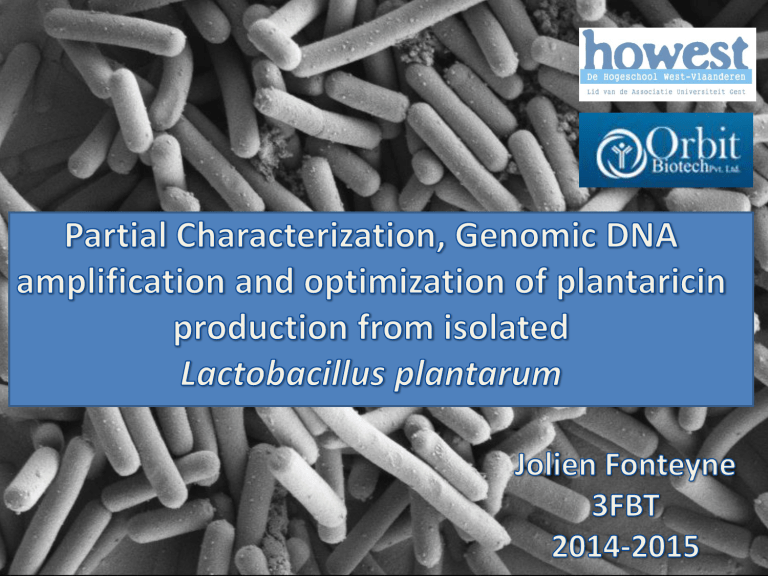
inhoud
•
•
•
•
•
Situering
Inleiding
Proefopzet
Resultaten en discussie
Conclusie
Stageplaats
• Orbit Biotech
– Mohali, India
– Noorden van India
• Onderzoekscentra in Probiotica
– Lactobacillus Plantarum
– 2 weken training
Titel project
• Partial Characterization
• Bewegelijkheid van bacterie
• Biochemische testen
• Karakteristieke probiotische eigenschappen
• Genomic DNA amplification
• PCR en gelelektroforese
Titel project
• Optimization of plantaricin production from
isolated Lactobacillus plantarum
– Optimalisatie plantaracine productie
– Aanwezige methode optimaliseren indien nodig
Wat zijn probiotica?
•
•
•
•
•
“Goede of hulpvolle” bacteriën
Gunstig effect gezondheid gastheer
Darmflora
Lactobacillus en Bifidobacterium
Gram positieve en melkzuur producerende
bacteriën
Probiotische voedsel bronnen
• Gefermenteerd voedsel
– Yoghurt
– Kaas
– Yakult®
• Gastheer zelf
– geboorte
Positieve effecten
• Irritable Bowel Syndrome (IBS)
• Reizigers of Antibiotisch-Geassocieerde
diarree
• Helicobacter Pylori
• Vaginale infecties
• Huid infecties bij kinderen
Doel
1. Identificatie Lactobacillus plantarum
– Karakteristieke eigenschappen
• Biochemische testen
• Probiotische eigenschappen
– Erfelijk materiaal
• Species bevestigen via PCR
Doel
2. Hoe reageren pathogene bacteriën op
plantaricine?
– Antimicrobiële activiteit
• Well diffusie methode
– Minimum Inhibitie Concentratie (MIC)
• Elisa reader
Beweeglijkheid van de bacterie
•
•
•
•
Wet mount method
Hanging drop method
U-Tube method
Cragie Tube method
NIET BEWEEGLIJK
Biochemische testen
• Resultaten zoals verwacht
• Uitzondering methylrood volgens bron
Probiotische eigenschappen
• Thermal Death point (TDP)
– Temperatuur waarbij organisme sterft binnen de
10 min
• 50 graden voor LP1 en LP2
• Thermal Death Time (TDT)
– tijdsduur nodig om het organisme te doden bij
een welbepaalde temperatuur
• 19 minuten voor LP1 en LP2
Probiotische eigenschappen
• Acid tolerance
– Nagaan bij welke pH het organisme kan overleven
• pH 3
• Bile tolerance
– Nagaan bij hoeveel procent gal het organisme kan
overleven
• 2-9 %
Genetische materiaal
• Primers
– Forward primer : Lac16S-for
AATGAGAGTTTGATCCTGGCT
– Reverse primer : Lac16S-rev
GAGGTGATCCAGCCGCAGGTT
Bacteriocine extractie van
Lactobacillus plantarum
• Peptiden geproduceerd door een bacterie dat
een bacteriedodende werking geeft tegenover
niet verwante bacteriën
• Groei dag 1-5
Antimicrobiële activiteit
• Welldiffusie methode
Micrococcus
S. typhi
C. Albicans
E. faecalis
S. Epidermidis
S. aureus
K. Pneumonia
E. coli
B. subtilis
V. cholera
Antimicrobiële activiteit
Inhibition zone for LP2 pathogens 6-10
14
Diameter of Zone (µm)
12
10
Micrococcus
8
S.epidermis
6
C. albicans
E.faecalis
4
pneumonia
2
0
0
1
2
3
Bacteriocin day of growth ( days)
4
5
Minimum Inhibitie Concentratie
• Laagste concentratie plantaricine nodig om
bacterie te doden
• ELISA reader
– Groei in titerwell platen
A
B
C
D
E
F
G
H
100 µL pathogen + 100 µL bacteriocin (1:1)
100 µL pathogen + 100 µL Mueller Hinton Broth + 100 µL
bacteriocin (1:2)
100 µL pathogen + 100 µL Mueller Hinton Broth (1:4)
100 µL pathogen + 100 µL Mueller Hinton Broth (1:8)
100 µL pathogen + 100 µL Mueller Hinton Broth (1:16)
100 µL pathogen + 100 µL Mueller Hinton Broth (1:32)
100 µL pathogen + 100 µL Mueller Hinton Broth (1:64)
100 µL pathogen + 100 µL Mueller Hinton Broth (control)
Minimum Inhibitie Concentratie
LP1
• Gemiddelde : ¼
• Uitzondering
LP2
K. pneumonia
Dag 1
Dag 2
Dag 3
Dag 4
Dag 5
Dag 1
Dag 2
Dag 3
Dag 4
Dag 5
A
0,730
0,771
0,946
0,836
0,771
0,722
0,766
0,914
0,814
0,787
0,827
0,844
0,804
0,816
0,867
0,820
0,814
1,448
1,326
1,470
1,453
1,478
1,458
1,346
1,433
1,431
1,481
1,449
1,501
1,463
1,433
B
C
D
0,811
0,813
– C.albicans
: ½ 0,837
1,469
1,420
1,468
– E.faecalis
: 1/81,530
1,487
1,153
E
1,421
1,402
1,432
1,421
1,403
1,420
1,426
1,446
1,440
1,296
F
1,336
1,378
1,401
1,381
1,370
1,321
1,376
1,445
1,434
1,288
G
1,124
1,186
1,346
1,367
1,110
1,122
1,189
1,376
1,375
1,114
H
1,412
1,398
1,402
1,335
1,392
1,410
1,372
1,347
1,412
1,335
Conclusie
• Onderzochte stock cultuur is Lactobacillus
plantarum
• Verder onderzoek verreist
• Experimenten herhalen
Goede eigenschappen probiotica
Toekomst perspectief
• Geschikte eigenschappen
– Gebruik voedingsindustrie
– Gebruik geneesmiddelen












